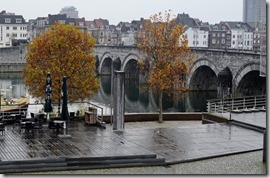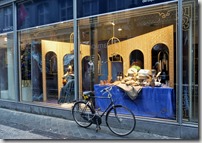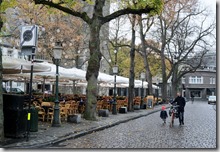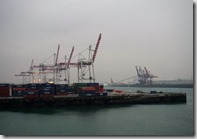Bump, bump, bump
 It was a trip I’ve made a hundred times. West of London to the ferries, the Dover crossing, the long straight motorway past Bruges, Ghent, around Brussels. The the washboard highway to Luik, a turn north at the Maas Crossing, and into the ‘skade to carry suitcases into the apartment around 7 pm.
It was a trip I’ve made a hundred times. West of London to the ferries, the Dover crossing, the long straight motorway past Bruges, Ghent, around Brussels. The the washboard highway to Luik, a turn north at the Maas Crossing, and into the ‘skade to carry suitcases into the apartment around 7 pm.
This started no differently: packed and out mid-morning, a break for business calls and lunch at the Channel Gateway, and a smooth crossing to Calais on a nearly-empty ferry.
Traffic moved easily on the European side, until we passed Ghent. The van ahead slowed abruptly, then stopped. My space closed quickly, but I stopped close behind him, as did the BMW behind me.
Not so, the coupe behind her.
There was a bump, bump, then a lurch, and a crunch. Damn. Seven cars opened doors along the left lane as everyone got out to see what the damage was.
The worst was two behind, the hood tented and the engine leaking. An SUV, trying to swerve, had crunched into the back tail of the driver at fault. Once we’d determined that nobody was injured, everyone rested against the median barriers, shaking their head, to wait for the police.
The ambulance was first, the medics going car to car asking if anyone was hurt and reminding us that symptoms may be delayed.
The Belgian police arrived next, collecting papers and statements. Passport, residency, driver’s license, registration, insurance,. I fortunately had them all (out of date insurance, but the lease car was current even if the paperwork lagged).
A tall administrator in a green vest moved through the group. This will take a while, he advised. The lead driver was Polish, he gestured behind, Two Russians there, you are English… He shook his head. This will take time.
The firemen arrived third: full yellow fire jackets, heavy helmets and boots. They set up cones, began directing the blocked traffic with flashlights, started sprinkling sand around the cars and whisking it in with brooms. There must have been twenty of them, delighted to be of service. There was quite a pageant in operation now, interviews underway, everyone checked for alcohol.
I admitted to one beer on the ferry a couple of hours before. You have the right to wait 15 minutes before you take the test, the policeman advised. It seemed meaningless; I took the 15-second blow and passed, as did everyone involved.
The flat-bed tow vehicle arrived last, winched up the crumpled Russian car, the two kids watching mournfully, and then the SUV. We were asked to follow on to the next rest area, a mile ahead. The back of my car was fine, but the front had a dimple where the hitch on the van ahead had planted into my grille and bumper. ‘still drivable, so we convoyed ahead.
I needed to write out a statement, and re-collect all of my documents. The police seemed eager to wrap this one up: only the woman from the BMW and the two Russians were left, answering questions in the back of a squad car. You can go, I will email you the report, nodded the policeman, and we scooted off.
I thought that the responses were handled professionally and with a minimum or time and disruption: the whole process complete in less than two hours. My insurance company has pans to fix the car in January, Thankfully, nobody was hurt, we were only an hour late arriving in Maastricht. I got a good story and the car has a temporary dent.
I’ve read that economies are boosted by disaster. The emergency services train for these events, and deploy their resources in a good cause. The towing and repair services find work, the police investigate and insurers negotiate. Everyone produces activity reports that contribute to effectiveness statistics.
Still, I wonder what became of the stranded Russians.
That time of the season
 ‘back in Poole, the weather unsettled, but nice to be off the road for the weekend. We’re in the middle of device testing, formal validations that provide necessary evidence of safety and efficacy to satisfy our regulators that our device is ready for market. Its a risky time: a negative finding, a major non-conformance, could set us back months.
‘back in Poole, the weather unsettled, but nice to be off the road for the weekend. We’re in the middle of device testing, formal validations that provide necessary evidence of safety and efficacy to satisfy our regulators that our device is ready for market. Its a risky time: a negative finding, a major non-conformance, could set us back months.
All the more important to keep some balance in life outside of work. ‘time apart with mijn wezen, regular attendance at BodyPump, escaping into a novel or Westworld: looking to my short and long term future.
Black Friday marks an abrupt start to the Christmas season in the United States. The Dutch, in contrast, start early and end early. They exchange presents and poems around December 5-6 (North and South Netherlands, respectively), preceded by the appearance of Sinterklaas. (and Zwarte Piet) in store windows. In the UK, things proceed more gradually, with a progression of Christmas Markets. It grows from small community affairs in November to larger city celebrations in December.
 WhatsOnDorset suggested two events for the weekend, one at the local Anglican church / school, and another at the Lighthouse, the arts venue for the city.
WhatsOnDorset suggested two events for the weekend, one at the local Anglican church / school, and another at the Lighthouse, the arts venue for the city.
 The Vine Church was first out of the gate. One pound granted access to 30 stalls, mostly crafts made by local members. It leans heavily towards small antiques, baked goods, and trifle crafts. A charming elf pointed the way to a small tea and cake room; choir members belted out seasonal melodies in the nave.
The Vine Church was first out of the gate. One pound granted access to 30 stalls, mostly crafts made by local members. It leans heavily towards small antiques, baked goods, and trifle crafts. A charming elf pointed the way to a small tea and cake room; choir members belted out seasonal melodies in the nave.
I tried to think of comparable events in the US: PTA fundraisers for school and church bazaars may be the closest. Very local, one-day, everyone is friends with everyone else sort of an affair.
The Lighthouse boasted over one hundred stalls (plus a reindeer and and double the entry fee), but was much the same inside: crafts, antiques, charities, and baked goods. There was even the same musty mothball aroma. I was hoping for some local Dorset artists, bespoke paintings and sculpture, but this wasn’t their event.
I like the intimacy and eccentricity of the events, staid and placid against the manic frenzy of Black Friday and Cyber Monday. I didn’t buy much, but appreciated it all: ‘mostly retired and home-centered crafts that come out yearly. Its marked contrast to the our pursuit of wide-screen electronics and designer fashions, more county fair than mass marketing.
and, perhaps, more in the spirit of the coming season.
Misty morning, Maastricht
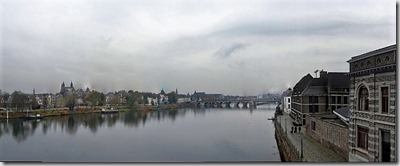 A damp and peaceful Sunday morning beneath dripping skies along the Maas. I moved the car (late, but unticketed) and took a long wander around the old center.
A damp and peaceful Sunday morning beneath dripping skies along the Maas. I moved the car (late, but unticketed) and took a long wander around the old center.
Taking photos of familiar touchstones feels like econnecting with the city and the people, colourful bomen en paraplu’s against grey kasseien en winkelpuien.
Bumping across the Channel
 I gave myself three hours and a bit to get to the Ferry docks at Dover: its been raining hard all night and likely that the M25 would see some accidents even on a light Saturday morning.
I gave myself three hours and a bit to get to the Ferry docks at Dover: its been raining hard all night and likely that the M25 would see some accidents even on a light Saturday morning.
Predictably, my tablet (long since replacing my trusty TomTom) chirped disaster as I approached the ring road: a block with an hour-long delay forming near the Gatwick exit. I sighed and turned into London, threading the neighborhoods to get around the block. I turned up the radio to escape thinking about the week.
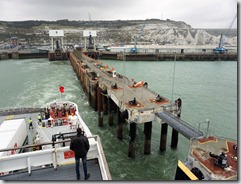 My podcasts were unified in their predictions of train wrecks after this week’s American election. There’s more than a whiff of Brexit-shock in the American media at the moment: a ‘sure-thing’ outcome upended by the democratic process. Change is needed, we need to move beyond Bush/Clinton. But undoing eight years of Obama’s accomplishments is not going to be good for global stability or for most people.
My podcasts were unified in their predictions of train wrecks after this week’s American election. There’s more than a whiff of Brexit-shock in the American media at the moment: a ‘sure-thing’ outcome upended by the democratic process. Change is needed, we need to move beyond Bush/Clinton. But undoing eight years of Obama’s accomplishments is not going to be good for global stability or for most people.
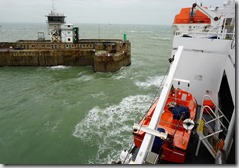 So I’m not happy about the prospect of a President Trump, and voted otherwise. I hope that multi-party democracy survives in both the US (and the UK, where Labor is struggling). In Trump, I’m hoping for the best, and that we will find that he governs (per Zito’s recent analysis) seriously instead of literally. As Van Jones observed in David Axelrod’s interview, we haven’t looked in on his half of the country to see how they were doing under globalization. In truth, they haven’t been doing very well, and we do need to take their problems as seriously as we do our liberal causes.
So I’m not happy about the prospect of a President Trump, and voted otherwise. I hope that multi-party democracy survives in both the US (and the UK, where Labor is struggling). In Trump, I’m hoping for the best, and that we will find that he governs (per Zito’s recent analysis) seriously instead of literally. As Van Jones observed in David Axelrod’s interview, we haven’t looked in on his half of the country to see how they were doing under globalization. In truth, they haven’t been doing very well, and we do need to take their problems as seriously as we do our liberal causes.
 Nowhere is this more clear than on immigration policy and multiculturalism. The Economist published a study showing that the rate of immigration was the best predictor of anti-immigration sentiment, rather than the amount of it. Humanitarian policies will need to adapt to this reality, limiting the pace of change for both sides, perhaps focused on keeping people in their homes rather than creating streams of refugees.
Nowhere is this more clear than on immigration policy and multiculturalism. The Economist published a study showing that the rate of immigration was the best predictor of anti-immigration sentiment, rather than the amount of it. Humanitarian policies will need to adapt to this reality, limiting the pace of change for both sides, perhaps focused on keeping people in their homes rather than creating streams of refugees.
 A recent This American Life illustrated clearly how the breakdown of trust between peoples happens. Initially, for St. Cloud Minnesota, it was just a simple zoning dispute. There were too many well-intentioned calls for more assimilation, too much false provocation by outside opportunists. I think eventual solution must be personal ones. Fears will abate once people on each side have friends on the other, as happened across racial and gay divides. But it will take time and tolerance, both of which may be lost under President Trump.
A recent This American Life illustrated clearly how the breakdown of trust between peoples happens. Initially, for St. Cloud Minnesota, it was just a simple zoning dispute. There were too many well-intentioned calls for more assimilation, too much false provocation by outside opportunists. I think eventual solution must be personal ones. Fears will abate once people on each side have friends on the other, as happened across racial and gay divides. But it will take time and tolerance, both of which may be lost under President Trump.
At least we can hope for a beautiful wall, as Mexican artists recently imagined.
Arriving at the docks, the wind is gusting, beating waves against the breakwall. It’s bitter cold on deck, winter not far away. Departure was interesting: closer to the harbour barriers than usual, bringing out the spectators. Once at sea, though, I got a bit of work done, and we pulled into Dunkirk at sunset. A sprint across Belgium, and an early evening arrival in Maastricht.
My Dutch home is neat and clean
, warm and familiar. I take a welkom bierje from Bert in the streetside cafe, a change from the secret gardens favoured in the UK. The world seems certain to draw apart in the coming years, it would be nice if political storms and economic winter were not a result.
At the Hastings Herring Fair
 This is Bonfire Weekend across the UK, celebrations of Guy Fawkes night held in communities and fireworks lasting towards morning. We spent it in the seaside fishing town of Hastings, along the East Sussex coast between Brighton and Dover.
This is Bonfire Weekend across the UK, celebrations of Guy Fawkes night held in communities and fireworks lasting towards morning. We spent it in the seaside fishing town of Hastings, along the East Sussex coast between Brighton and Dover.
The town is famous for the Battle of Hastings in 1066, the tart of the Norman
Conquest of England. The battle between William, Duke of Normandy and King Godwinson of England was lost n October 14, and the town celebrates with historical reenactments and bonfires two weeks ahead of Guy Fawkes night. So, the town was quiet, the nearest celebrations over an hour away.
However, luck on our side, Hastings was holding its annual Herring Fair.
A celebration of all things fishy, there were local deep-fried fish dishes, craft beers, and sea shantys sung throughout the day. I avoided the cooking classes in favour of enjoying the music, the docks, and a few conversations with the locals.
A few London-name acts appeared, but were mostly late and unenthusiastic compared
to the town-based musicians. The smoked fish was excellent (my w.wezen gave me my first taste of milk-poached kippers and mackerels were prepared back at home the next day –actually a joy despite my suspicion of fish and egg combination breakfast), and the beers were pleasingly strong (especially when compared to the watery brews offered in Chicago’s pubs).






































